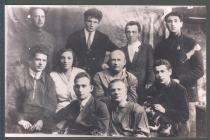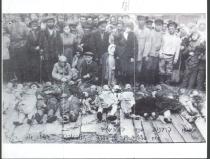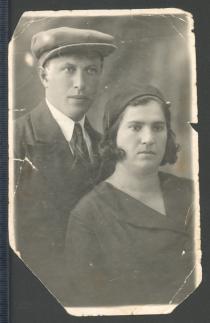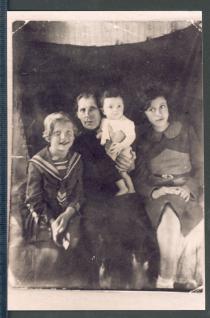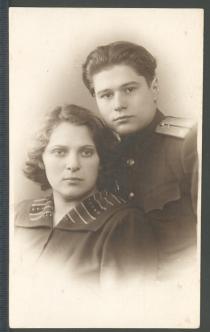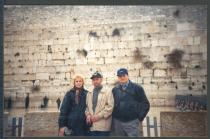This is a photo of my parents, Israil and Galina Maron (maiden name Kosoi). It was taken in 1931 by the Chechersk photographer Portnov, right before my birth. Here my father is 26 and my mother is 24. He was known for his unusual charm and desire to help any person in need. He might even take off his last shirt.
He was a singer and dancer, taking part in a drama circle before the war (until 1939). For his role as Platon Krechet in Minsk he received first prize in a folk art contest- a bicycle. He read Apukhtina beautifully, sang songs, and was a very wise and sociable person, loved by women. He was the representative for the first agricultural commune in the village of Edinstvo, Chechersk region, and was injured by bandits. In the end of the 1920's the peasants sent him to Kirov for help, probably because it dealt with agricultural machines, which were made in Petersburg. He came to the audience and directed the conversation so well that Kirov offered him a place in Petersburg. My father refused, however, saying that he was needed more in the village. Kirov fulfilled the peasants' request and even helped my father out in his personal affairs. He allowed my sister Bronislava, who was born with congenital dislocation of the hip to enter the military medical academy, where they performed an operation that was, for that time, unique. After party-economic study, Father became the head of the finance department in Chechersk.
In 1939-40 he was sent to do party work in the Belostoksk Region. He planned to get settled and bring over his family but didn't get to: the war interfered. Four days before the start of the war, accurately diagnosing the conditions at the border, he sent Mama a telegram: "hold off on arrival." Father perished on the very first day of the war, when he carried party archives during bombing: a bomb landed on his car. They were to have taken the archive to the Osovi fort. His co-worker, Katz, who he sent for from Chechersk, was a witness. However, a bomb also fell on Katz's car; he was injured and captured. He then escaped and got back to our side. All those who escaped with him were sent to a penal battalion, but her was sent to Siberia. He was asked, "how could you, a Jew, have survived?" From prison he returned sick and broken. My father was listed "missing in action."
My mother, Galina Borukhovna Maron (maiden name Kosaya), was born in 1907 in the village of Zagore, Chechersk uyezd. Her personality differed from my Father's. She was also a very kind and charming person, but quiet, home-loving. She sewed well but didn't take part in any sewing circles. Her looks were very modest, differing from Father. She was born into a religious family where Jewish traditions were observed. Before the revolution she and her brother studied at Hebrew school, then in secondary school in Chechersk. She graduated from the Chechersk agricultural school. She was an accountant by specialty. My parents met in the village of Zagore, where Mama lived with her parents and Papa visited his brother Miron. When, after the pogrom, both families moved to Chechersk, Mama and Papa dated there and in 1926 were married. They lived in one big house with grandmother Mera, mother's mother. Both my sisters and I were born in Chechersk.
When the war began, Mama, along with us, was evacuated first to Stalingrad region, then to Omsk region. At the station Moskalennaya in Omsk region, she worked as head accountant for the Moskalennaya "raipotrebsoyus" (regional union of consumers).
Mama was found guilty of the 109 statue - negligent relationship to her responsibility at work- and given 8 years in prison. Mother was freed during the amnesty after Stalin's death- she only served six years. The charges against her were dropped. She returned to Chechersk and began working as an accountant-cashier for the village shop. Then the representative of the 'raipotrebsoyus' changed and she was instantly fired. He turned out to be a former member of the politzei who had executed Jews during the war. Mama worked in a kindergarten, and then got sick and was forced to leave her work. She lived with her younger daughter Anna in Gomel. Her time in jail didn't disappear without a trace. In December 1965 she was admitted to the psychiatric hospital. Mama was released in April and she left for Ust-Kammenogorsk and her oldest daughter, who was a doctor. Mama died there in 1973.

